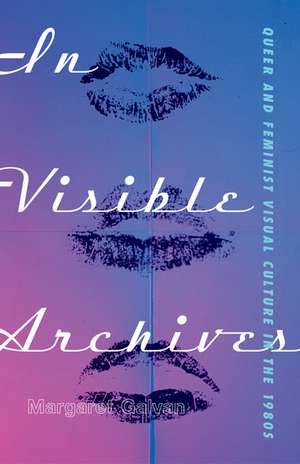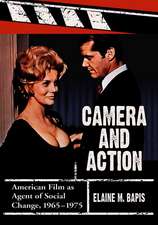In Visible Archives: Queer and Feminist Visual Culture in the 1980s
Autor Margaret Galvanen Limba Engleză Paperback – 26 sep 2023
In 1982, the protests of antiporn feminists sparked the censorship of the Diary of a Conference on Sexuality, a radical and sexually evocative image-text volume whose silencing became a symbol for the irresolvable feminist sex wars. In Visible Archives documents the community networks that produced this resonant artifact and others, analyzing how visual culture provided a vital space for women artists to theorize and visualize their own bodies and sexualities.
Margaret Galvan explores a number of feminist and cultural touchstones—the feminist sex wars, the HIV/AIDS crisis, the women in print movement, and countercultural grassroots periodical networks—and examines how visual culture interacts with these pivotal moments. She goes deep into the records to bring together a decade’s worth of research in grassroots and university archives that include comics, collages, photographs, drawings, and other image-text media produced by women, including Hannah Alderfer, Beth Jaker, Marybeth Nelson, Roberta Gregory, Lee Marrs, Alison Bechdel, Gloria Anzaldúa, and Nan Goldin.
The art highlighted in In Visible Archives demonstrates how women represented their bodies and sexualities on their own terms and created visibility for new, diverse identities, thus serving as blueprints for future activism and advocacy—work that is urgent now more than ever as LGBTQ+ and women’s rights face challenges and restrictions across the nation.
Preț: 186.44 lei
Nou
Puncte Express: 280
Preț estimativ în valută:
35.68€ • 37.11$ • 29.46£
35.68€ • 37.11$ • 29.46£
Carte disponibilă
Livrare economică 24 martie-07 aprilie
Livrare express 07-13 martie pentru 27.53 lei
Preluare comenzi: 021 569.72.76
Specificații
ISBN-13: 9781517903244
ISBN-10: 1517903246
Pagini: 336
Ilustrații: 65 black and white illustrations
Dimensiuni: 140 x 216 x 20 mm
Greutate: 0.43 kg
Editura: University of Minnesota Press
Colecția Univ Of Minnesota Press
ISBN-10: 1517903246
Pagini: 336
Ilustrații: 65 black and white illustrations
Dimensiuni: 140 x 216 x 20 mm
Greutate: 0.43 kg
Editura: University of Minnesota Press
Colecția Univ Of Minnesota Press
Notă biografică
Margaret Galvan is assistant professor of English at the University of Florida.
Recenzii
"Margaret Galvan asks all the right questions about queer and feminist visual storytelling from the 1980s: Where were these works situated? How did communities use them? How have they been archived? Both commentary upon as well as an integral part of the activist project begun by the creators themselves, In Visible Archives helps keep these remarkable works visible for us all."—Justin Hall, California College of the Arts, editor of No Straight Lines
"This wonderful book demonstrates the critical importance of community-based archives. Utilizing primary source materials, Margaret Galvan has produced an original and consequential contribution to the history of the feminist sex wars, and her attention to the visual aspects of those documents provides long overdue recognition to the period’s artists, designers, and activists."—Gayle Rubin, University of Michigan
"Margaret Galvan asks all the right questions about queer and feminist visual storytelling from the 1980s: Where were these works situated? How did communities use them? How have they been archived? Both commentary upon as well as an integral part of the activist project begun by the creators themselves, In Visible Archives helps keep these remarkable works visible for us all."—Justin Hall, California College of the Arts, editor of No Straight Lines
"This wonderful book demonstrates the critical importance of community-based archives. Utilizing primary source materials, Margaret Galvan has produced an original and consequential contribution to the history of the feminist sex wars, and her attention to the visual aspects of those documents provides long overdue recognition to the period’s artists, designers, and activists."—Gayle Rubin, University of Michigan
"Margaret Galvan‘s In Visible Archives explores the political power of archival material in shaping feminist and queer futures. Applying archival studies and comics scholarship to work from the 1980s by visual artists including Alison Bechdel and Nan Goldin, Galvan’s timely book underscores the importance of visibility in ongoing activism and community-building."—LSE Review of Books
"In Visible Archives provides a thought-provoking and grounded exploration of feminist and queer visual culture and archives from the American 1980s."—Archives and Records
"Margaret Galvan’s In Visible Archives is a brilliant work and a major step forward for the field...It should be read by anyone who studies comics from a feminist, queer, and/or archival perspective, and indeed by any serious comics scholar."—Journal of Graphic Novels and Comics
"Galvan has written a galvanizing book that I think all archivists would benefit from reading. Not only is the subject matter important, but it is also well written and fun to read."—The American Archivist
"An extremely careful, deliberate, and impeccably researched book, which admirably advances the field by making neglected texts newly visible and illuminating neglected sympathies between contexts and modes of production that have seldom, if ever, been placed in conversation."—Inks: The Journal of the Comics Studies Society
"In Visible Archives is not merely a text documenting the scholarly, cultural, and social role of archives, but is also a record that reminds readers of the vital and concrete work of activism."—ImageTexT
"This wonderful book demonstrates the critical importance of community-based archives. Utilizing primary source materials, Margaret Galvan has produced an original and consequential contribution to the history of the feminist sex wars, and her attention to the visual aspects of those documents provides long overdue recognition to the period’s artists, designers, and activists."—Gayle Rubin, University of Michigan
"Margaret Galvan asks all the right questions about queer and feminist visual storytelling from the 1980s: Where were these works situated? How did communities use them? How have they been archived? Both commentary upon as well as an integral part of the activist project begun by the creators themselves, In Visible Archives helps keep these remarkable works visible for us all."—Justin Hall, California College of the Arts, editor of No Straight Lines
"This wonderful book demonstrates the critical importance of community-based archives. Utilizing primary source materials, Margaret Galvan has produced an original and consequential contribution to the history of the feminist sex wars, and her attention to the visual aspects of those documents provides long overdue recognition to the period’s artists, designers, and activists."—Gayle Rubin, University of Michigan
"Margaret Galvan‘s In Visible Archives explores the political power of archival material in shaping feminist and queer futures. Applying archival studies and comics scholarship to work from the 1980s by visual artists including Alison Bechdel and Nan Goldin, Galvan’s timely book underscores the importance of visibility in ongoing activism and community-building."—LSE Review of Books
"In Visible Archives provides a thought-provoking and grounded exploration of feminist and queer visual culture and archives from the American 1980s."—Archives and Records
"Margaret Galvan’s In Visible Archives is a brilliant work and a major step forward for the field...It should be read by anyone who studies comics from a feminist, queer, and/or archival perspective, and indeed by any serious comics scholar."—Journal of Graphic Novels and Comics
"Galvan has written a galvanizing book that I think all archivists would benefit from reading. Not only is the subject matter important, but it is also well written and fun to read."—The American Archivist
"An extremely careful, deliberate, and impeccably researched book, which admirably advances the field by making neglected texts newly visible and illuminating neglected sympathies between contexts and modes of production that have seldom, if ever, been placed in conversation."—Inks: The Journal of the Comics Studies Society
"In Visible Archives is not merely a text documenting the scholarly, cultural, and social role of archives, but is also a record that reminds readers of the vital and concrete work of activism."—ImageTexT














